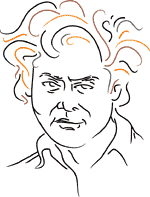
(with thanks to The Irish Times, where this first appeared)
W.S. Merwin, Selected Poems. Bloodaxe Books.190pp. UK£9.95
The first poems that W.S. Merwin wrote were hymns for his Presbyterian minister father and in a way the impulse stuck; the poems he has written over a long career are impelled by belief. He is a poet of strong passions, as an environmentalist and pacifist who writes quietly and subtly and often to great effect. He started off with the expected accomplishments of a poet of his generation (he was born in New York in 1927): the smoothly articulated poem, a kind of off-the-peg, generic rhetoric. But then, as did his whole generation, he began to simplify, to look for the essentials that would leave enough to drive a poem but keep it as bare as possible, close to experience but unadorned with grandiosity.
Not that simplicity of form means simplicity of content. Merwin aims always for clarity but his thought is subtle. There are the very effective directly engaged poems like ‘For a Coming Extinction’: ‘Grey whale/Now that we are sending you to The End/That great god/Tell him/That we who follow you invented forgiveness/And forgive nothing...//Tell him/That it is we who are important.’ Or the bitter anger of his anti-Vietnam poem ‘The Asians Dying’: ‘When the forests have been destroyed their darkness remains//...Rain falls into the open eyes of the dead/Again again with its pointless sound/When the moon finds them they are the color of everything.’
But there are also the poems which struggle with the limits of the sayable. In an interview in The Irish Times he said that ‘poetry is about what we can’t talk about. It’s about what we can’t express.’ A great deal of Merwin’s work hinges on this sense of what language is not capable of expressing, like the pencil that hides all the ‘words that have never been written/never been spoken/never been taught’, or like the bleak acknowledgement of ‘Elegy’ (not, alas, in this book) which reads in its entirety ‘Who would I show it to’.
He writes about nature without sentimentality, without trying to hold on it and make it signify. He returns frequently to the human remove from the world – there’s often a sense that we’re hardly in the world, hardly know it, but stumble half-blindly towards it, as in ‘Hearing the Names of the Valleys’:
the color of water flows all day and all night
the old man tells me the name of it
and as he says it I forget it
Often too, man is a devouring insect ‘eating the forests/eating the earth and the water//and dying of them/departing from ourselves//leaving you the morning/in its antiquity.’
He has published a large body of work, and is also a distinguished translator of poetry, yet the reputation has been largely an American one. Even if few might see him, as the blurb claims, as ‘the most influential poet of the last half-century’, this fairly slim selection usefully introduces several decades of the work of a significant poet who, when asked what he most looked for in a poem, responded immediately: ‘Surprise’.

No comments:
Post a Comment